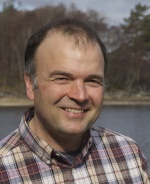
Professor Stefan Hoppler
University Diploma (equiv. to MSc) in Zoology and Molecular Biology, Univ. of Zürich, Switzerland. Dr. phil. II (equiv. to Ph.D.) in Zoology, Univ. of Zürich, Switzerland
Personal Chair

University Diploma (equiv. to MSc) in Zoology and Molecular Biology, Univ. of Zürich, Switzerland. Dr. phil. II (equiv. to Ph.D.) in Zoology, Univ. of Zürich, Switzerland
Personal Chair